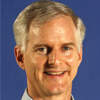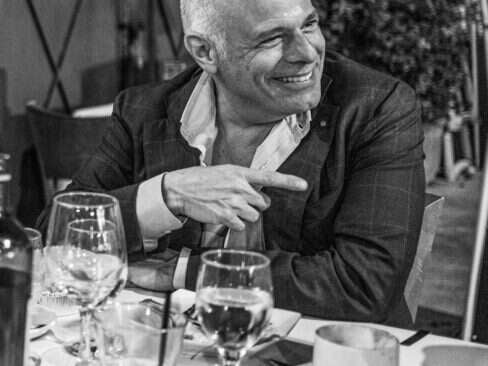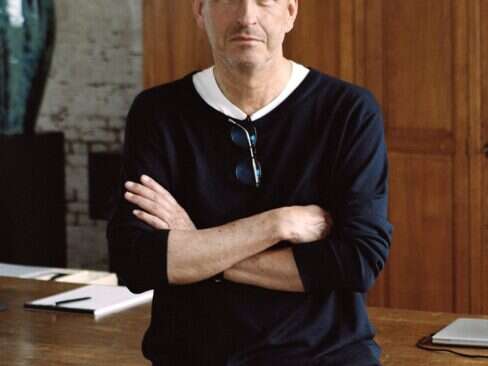
Chief Operating OfficerCathay Pacific Airways
Like many Cathay Pacific Airways executives John Slosar has spent his entire career working either directly for the airline or different outposts of John Swire & Sons, a London-based, multi-national whose operations and interests include deep-sea shipping, cold storage, road transport, and agricultural activities in Australia, Papua New Guinea, East Africa, Sri Lanka, the USA and UK. With the global airline industry set to lose $11 billion this year, Slosar is navigating the Hong Kong-based airline through some of the bumpiest skies the industry has seen. Elite Traveler President & Editor-in-Chief Douglas Gollan recently visited the Chief Operating Officer at the airline’s headquarters adjacent to Hong Kong International Airport to discuss how Cathay is maintaining its service standards in an era when commercial airline travel is getting markedly worse.
ET: Here at the end of September, how’s business?
John Slosar: History shows air cargo tends to be a very good leading indicator. Air cargo for us had been really dire from last year at about this time until April, and since then it is slowly picking up step by step. There was a guy from a bank who told me, ‘You tell me when air cargo starts picking up and I’ll make you rich.’ He hasn’t delivered on that yet, but air cargo is definitely picking up and normally the rest of the business tends to follow that.
ET: Yet the International Air Transport Association [IATA] is forecasting record losses, and recently revised those losses upward to $11 billion for the industry.
John Slosar: The IATA forecasts don’t make for very happy reading but I’m afraid they are pretty accurate. Aviation is a business that is highly leveraged up and down. I think the combination in 2008 of really high oil prices followed by a collapse in the marketplace, largely in the front end [First and Business Class] has put a lot of airlines in a difficult position. And if you find anybody who’s not saying that please give me his number so I can call him and find out how he’s managing to escape the worst storm. It was a pretty broad-based storm, and we’re pretty used to crisis here. We had the Asian financial crisis, 9/11, SARs. So the funny story is I came back to Cathay two years ago—I had been running the Coca Cola [distribution] business [owned by Swire] for nine years in China—and I asked, ‘What are you good at here? What are your core competencies?’ It was a sort of management type question, and they said, ‘We’re really good at managing crises,’ and I thought that was interesting, but in the end, that’s a pretty good thing. In the past four crises, passenger business always took a beating but cargo stayed steady. This is the first time in the last four [crises] that passenger and cargo have been challenged at the same time.
ET: Your principal shareholder, Swire Pacific [which owns almost 42 percent of Cathay Pacific], has been around for over 150 years. Does that change the way you look at something like this?
John Slosar: The key highlight of your point is the Swire family has been at it for the long term so they look beyond the next six months. They look towards building value in the business for the long term. Like any business we have to look at what’s happening in the next year so we can also look at the long term.
ET: In that case what is Cathay Pacific doing?
John Slosar: We embarked on a big product refresh a couple years back, which was quite a Herculean task as it involved replacing our first, business and economy class all at the same time at considerable expense. In fact the code name of the project was Hercules. Even a year ago when things were difficult we didn’t stop. We kept it going and we will finish it pretty much on schedule next month. The easy thing would have been to just stop the expenditure. But why would keeping the old product be better for the customers in the long run? So [we made the decision] to get through this and when things are looking better it will bring value back to us.
ET: Recently British Airways, a ‘full-service’ carrier said it would start charging many customers for seat assignments when they make their booking.
John Slosar: There are some interesting trends in the business but the central issue in aviation and in any business, and you see companies mistake this all the time, is they mistake price for value. If you’re generating high value you can probably generate pricing to cover the value you’re providing. If you’re generating low value you’re going to be stuck having to price low because if you’re not giving anybody any value you’re not going to get a high price for it. A lot of companies mistake price for value, and airlines are certainly all about low cost, low cost, low cost. If that means low value, of course it’s going to be low cost, because that’s all anyone’s going to pay for. So we try to keep focused on delivering value for the customer. What do they value? What will they find valuable if we provide it? And then, how do we deliver it? How do we recover the cost for it? When you see things like people wanting to charge for checking a bag or reserving a seat, you have to ask yourself if that’s a good idea. Is it really to compensate for not delivering value in other parts of your service or business? Is that going to really save you? Or are you just putting a band-aid on it.
ET: How do you handle these issues at Cathay Pacific?
John Slosar: We try to deliver value. We keep very much in touch with our customers. We know they have specific requirements. There are certain things that are very important to them. If you’re flying halfway around the world to get here to do important business, you must be an important person in your company, and your company is paying a lot of money to get you here. They want you here rested, fresh. They don’t want you to need three days to recover before you can do anything. So we know the service and product we provide on that trip over is very important and we continue to invest in it because that’s what provides value.
ET: Lufthansa and Air France have introduced services where First Class passengers are taken to and from their flights by sedans (at their hubs in Frankfurt, Munich and Paris), and Lufthansa has created a separate First Class Terminal. Is Cathay looking at any services like these?
John Slosar: Another part of the value you have to look at is the airport experience. People want to get through the airport as quickly as possible. We just did a survey of our frequent travelers. We cut off the flights [for check-in] 40 minutes before departure, so they can get through immigration and security. Given that, we asked them how far in advance would their optimal time for arriving be. They said 42 minutes. That’s not a surprise because these are busy people. If they happen to show up early we have fantastic lounges with wireless email, showers, dining, but ultimately we have to work on getting them through [the airport quickly], and luckily Hong Kong International Airport is generally first or second in the world for airports. So we don’t have to compensate with sedans and all this kind of stuff. In a way it’s putting a band-aid on a fundamental problem—that the airports aren’t that efficient and you can’t get through them easily.
ET: Korean Air, Lufthansa, Swiss, Delta, Qatar Airways and a few others have private jet divisions so if a customer flies on their intercontinental services and then needs to hop around the region, they have a solution. China just announced it will reduce the approval window for private jet flights from about five days to three hours for private jets based in China. Would Cathay look at some type of private jet service tailored to executives who need to hop around the region?
John Slosar: We’re not there yet, but its something we are keeping an eye on. Up until now it has been very difficult to organize [private jet travel in China] to the extent that if China loosens that up I think there will be a lot of interest and a lot of demand, and given our expertise dealing in China we can do a pretty good job of that.
ET: Any similarities between running Coca Cola or lessons learned that apply here at Cathay Pacific?
John Slosar: When I first came over I gave a speech for all of Cathay management. It was lessons I learned at Coke that could be of interest to all of them. First of all, it’s about value. Even in soft drinks, it’s all about value. It’s not about price. Making sure you understand the difference between the two especially for elite travelers is very important. They’re looking at the value because they’re spending a fair amount of money on what they’re buying, so it’s the value that they’re concerned about more than the money. One of the important things about Fast Moving Consumer Goods [FMCG] is you have to constantly be doing things to attract the customer to pick up the product and always keeping the focus on what you’re doing to keep people interested. The F in FMCG stands for fast. Markets move, and if you don’t keep up with them they leave you behind. Airlines are not generally renowned for being the fastest moving business in the world, and I think having a bit more of an FMCG mentality is a good thing to bring to an airline.
ET: Any specific examples translating that to Cathay?
John Slosar: In all of the things we’ve done, we’ve tried to look at the service from the way our customers look at it. We’ve done applications on phones so you can auto check-in. Last month a fifth of our passengers didn’t check in at the airport. So we try to look at it the way they do, which is, ‘Get me through [the airport] quickly and efficiently, treat me well and get me to my destination, and I’m a happy camper.’
ET: Cathay was recently named #1 Admired Company here in Hong Kong by The Wall Street Journal.
John Slosar: We took great delight in receiving that. It’s not easy to get there. One of the hard things about an airline is your service can be planned out by a small group of people who are very smart but it has to be delivered by tens of thousands of people who work very hard. You don’t see them all the time, and you have to get those people organized to deliver just the right service in just the right way. It takes a lot of training and a lot of management and a lot of attention to achieve that, so we felt really good about winning.
ET: In North America, it’s sort of car dealers, lawyers and airlines at the bottom of these lists. Is there a secret sauce for Cathay’s success?
John Slosar: Luckily we’re not in North America and out here we’re not quite as far down the totem pole. I don’t think there’s an easy secret sauce. We try to build a good individual relationship with our staff. If they feel good about what they’re doing then the company can deliver good service to the people who are using our service. We do spend a lot of time on training.
ET: The rumor is you like to make sales calls. I’m not sure that’s really common place for an airline CEO or COO.
John Slosar: Another tenet of FMCGs is to go see the customers, so whenever we’re out we try to go see some customers. We like to hear what they have to say. The truth of this business is not in this building. It’s out there somewhere and it’s always good to find it before it finds you.
ET: Recently your CEO Tony Tyler said that supplier prices were too high. Do you get the same feedback from your customers? And how do you rationalize this when a company is not making money?
John Slosar: Tony’s point, which is factual, is if you look at aviation as a business, all the suppliers to the airlines make money. It’s just the airlines that don’t. It’s the airlines that are buying all of this stuff. How can they not balance the risk and return with the rest of the supply part of the aviation business? I think that’s largely because airlines themselves are extremely competitive as businesses go. Sometimes the supplier base is not as competitive as the airlines themselves. Warren Buffet advised not to invest in airlines. He made quite a sage point, which was that airlines are not good businesses because airlines are complicated businesses. There’s a lot going on. Passengers don’t see the complications therefore they are not willing to pay for it. They don’t see the value that has to go into delivering a good service and therefore they are not willing to pay for it. As an airline, making sure you really do deliver value and [customers] see it is all the more important because if they don’t see the value, they aren’t going to be willing to pay for it.
ET: With a large conglomerate, Swire, owning around 42 percent, does Cathay maybe have a bit of a different ownership structure than most airlines?
John Slosar: We are a completely independent commercial company. We don’t get any state aid. The one thing Swire has done for us is we have a long term solid major shareholder that has a solid long term interest in developing the business, and as I said that allows us to take long term decisions and think about what the business needs to be two years from now. I think in any business if you are trying to manage it quarter by quarter only, it is very difficult because there are very few businesses that don’t require a long term thinking process about what you need to do to be successful.
ET: And the Swire philosophy is to be low-key it seems.
John Slosar: The Swire motto is Esse Quam Videri—a Latin aphorism that may be translated as ‘to be, and not to seem to be.’ Function rather than form, steak not sizzle. The group is always focused on delivering results, getting down to business and making good things happen—not so much the PR side of it.
ET: It seems a bit different than many large companies.
John Slosar: Most of us here wouldn’t know; I’ve been in Swire over 29 years. Speaking for the people who are here, I think we really like the culture, and it’s a culture that truly pervades all the Swire businesses. It’s about doing the right things for the business over the long term and less about PR or everybody claiming credit. It’s a very supportive, functionally-consistent culture that rewards people for getting in, working hard, being creative and doing good things.
ET: Anything else you think our readers would find interesting?
John Slosar: We certainly know a lot of them have traveled on our First Class product. We’ve had fantastic reviews, and although it cost a bomb to do it, we think its been absolutely worthwhile because it delivers the value they wanted to see delivered. We’re going to continually invest in the product over time because Cathay always targets being among the premium group of airlines.
If real estate is about location, location, location, aviation is too in many ways. Hong Kong is a great hub, it’s great for China, it’s great for most of Asia, so we believe the combination of a superb product and a hub where you can quickly go hither and yon beyond Hong Kong to anywhere is an unbeatable combination.
Lastly, but very importantly, we’re strongly involved with Air China up in Beijing. They will shortly own nearly 30 percent of us and we will own 18 percent of them. China is going to be a huge market going forward. The big story in travel the next 20 years is going to be the China travel market going outbound. Having spent a large part of my career there in the Coke business, everybody in China wants to travel. They all want to go to New York, San Francisco, London, Paris, Sydney from the top executive down to the guy in the coat room, and we are going to work hard with Air China to realize the vision of that over the next couple decades.










